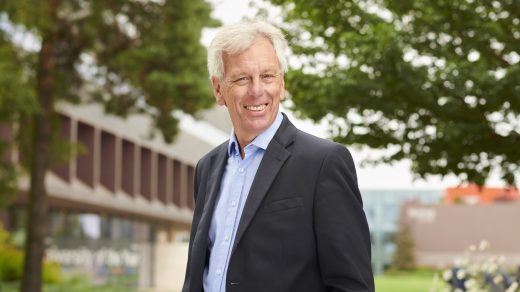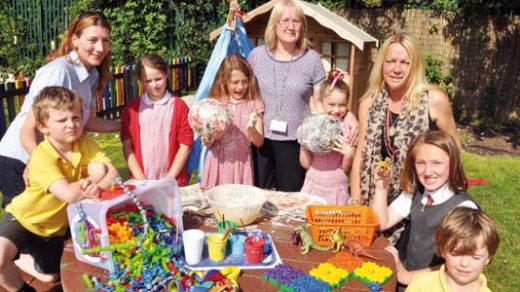New ways of working and moving forward
Sponsored content
The past few months have been challenging for everyone and have changed the way many people are working. The team at School Improvement Liverpool (SIL) talk to Educate about their new ways of working, challenges they have encountered and how they are moving forward.
Sue Killen from the Primary Learning Team said: “The Primary Learning Team at SIL provides teaching, learning and leadership support across the majority of subjects within the primary curriculum. Traditionally, our training sessions, briefings, staff meetings and one to one support have been delivered through face to face contact but in March 2020, this came to an abrupt halt due to ‘lockdown’ and it became necessary for us to quickly adapt to the situation and discover new ways of working.
“Zoom, which to a lot of people was just a 1980’s pop song, became central to our working day and the main way to communicate with each other and with colleagues in schools. Once we overcame login barriers, learned how to share screens, set up breakout rooms (and unmute ourselves!), we were up and running and modified our sessions to reflect the requirements of online training.”
Sue added: “Our aim was to ensure that our offer to schools was not compromised but we understood that with everything else schools were having to contend with, uptake of CPD might be low. We need not have worried, staff in schools are hugely dedicated and resilient. Alongside running hubs, providing online learning, ordering free school meal vouchers, PPE equipment and meeting the needs of the most vulnerable learners, teachers and leaders have accessed our online sessions in their hundreds.
“As a team, we have turned a necessity into an opportunity and have increased our social media presence to communicate with schools in new and different ways. The number of twitter followers we have on @SILPrimary continues to grow and followers are enjoying engaging with new initiatives such as #howtoin2, #CPDin3, #knowmorein4, all developed to support both school and home learning.”
Sue concluded: “We are a team that embraces change and despite the recent rate of change being unusually fast, we have responded swiftly to ensure that our partnerships with schools in Liverpool and beyond have remained as strong as ever!”
Upon speaking with Kim Salisbury from the Early Years Team, she said: “This year has been a challenging one for all and one in which we have had to reflect on the ways in which we work and adapt to change at a rapid pace. It is a year that has helped us to identify ways to proactively do things differently.
Moving our training and support online is just one example of the adaptations we have made and we appreciate the support and feedback from those whom have attended our training sessions; “We have had participants join us from their living rooms, classrooms, staff rooms and even, on occasion, the most convenient storage cupboard! We have delivered training across Liverpool and further afield having received requests from neighbouring authorities. We have even delivered on a national scale in partnership with nasen through SEND Masterclasses funded by the DfE. To have been able to reach such a wide audience and discuss the views and experiences of our early years colleagues from across the city as well as beyond has been both insightful and rewarding.”
Kim continued: “The great benefit of online training is that it can be accessed anywhere. No public transport or parking spaces to worry about. Those who find it difficult to attend training under normal circumstances have welcomed the opportunity to join us online. Pre-recorded sessions have also proved very popular. The ability to log onto a session without the need for supply cover can be very appealing.
She added: “We always aim to enthuse and inspire those who attend our training or receive support from us and we are delighted that this has continued while using online models. When you are part of a great teaching session, you feel like you can take on the world!
“As we reflect on lock down and think back to lessons learned along the way we will continue to offer support in a variety of accessible ways for our schools and nursery settings. We have more online training planned including a new Boys’ Attainment Network and a series of SEND Masterclasses. We will be offering support through a range of platforms including phone calls, emails, social media, Zoom sessions and Teams meetings. We are here and we look forward to continuing to evolve as we move towards a new normal.”
Kim goes on to thank everyone who has stayed in contact and offered support, in spite of their own challenges. She said: “Thank you so much for all the useful information and support at this crazy time and for adapting your ways of working!
“We look forward to meeting you, supporting you and training with you, whether this be on the screen or in real life, in the near future.”
Yvonne Sutton, who works in the SEND and Inclusive Learning Team at SIL , said: “I think that recent months can be encapsulated in an assembly song lyric I remember from my school days of long ago, that being ‘Each day different and every day new’.
“For the children and young people with SEND, their families and the professionals supporting them through the COVID-19 pandemic and the subsequent ‘lockdown’ presented a set of additional challenges. Navigating the myriad of rapidly changing guidance and advice could be confusing, complicated and often open to interpretation. If ever there was a need for a ‘Graduated Approach’ to decision making this was it.
As a team we had to quickly assimilate the new information in order to help colleagues supportthis particularly vulnerable group of children. Due to the changing landscape, at times I only felt one step ahead, However, by embracing an ‘assess, plan, do and review’ approach and assimilating it to an ‘evaluate, formulate, action and reflect’ process I found adapting to new ways of working developed naturally.”
Yvonne went on: “From those early days of supporting Liverpool Hubs to co-producing guidance and facilitating meetings the recent restrictions imposed meant that all aspects of the role had to be approached in a different way. Although it could be viewed that these changes were foisted onto us, the SEND and Inclusive Learning Team have for some time explored different ways of offering support and training.
As such I prefer to think of the changes as an acceleration of change into an exciting future which will combine virtual meetings, online training and face to face interaction.
“Working days now consist of conference calls sprinkled with online training and webinars delivered via a range of virtual platforms. With the help of wonderful colleagues at SIL my skill set in using the necessary technology is slowly developing. Not knowing how it all ‘works’ my ever- present worry is that the internet will fail me at a key moment. Unfortunately it did just that recently when delivering a Masterclass for nasen and the DfE.
“The image of a swan came to mind when I received a lovely email from an Educational Psychologist following the session, calm above the water whilst paddling frantically underneath: ‘Just wanted to say well done to you for this afternoon’s webinar. You both did a great job despite the technology issues and were beacons of calm and serenity!’
She concluded: “In just the same way that children and young people each have a unique set of strengths and areas for development and also a unique set of responses to the current situation then so too do adults. Colleagues across settings and agencies have shown resilience, determination, flexibility and innovation in their plans to support the children and young people in their care. Managing expectations and perceptions has become a key aspect of my role in conjunction with offering advice and guidance, being a critical friend offering supportive challenge, as a trainer or a facilitator. Sometimes what is needed is reassurance, and that is always on offer too.
“The foreword of the Special educational needs code of practice:0-25years sets out the vison for children with special educational needs and disabilities as being the same as for all children and young people. The aim is that they achieve well in their early years, at school and in college, and lead happy and fulfilled lives. This unprecedented situation provides an opportunity to review, reflect on and strengthen processes and systems through coproduction and with transparency to ensure the vision becomes reality.”
Next, we speak with Derek Stanley from the Secondary Team. He said “The lockdown period forced me to get to grips with the delivery of science CPD online. The challenge came in the form of a request for five sessions for a group of science teachers in April not long after the schools closed. Having never attempted this before I was quite apprehensive. The range of considerations included things like how to take questions and encourage discussion and collaboration; how will I come across as a ‘talking head’ in the corner of the screen! But the thing that was worrying me most was how to communicate practical science activities in a meaningful way. After discussions with colleagues and some basic training in how to use the zoom platform I set about planning and delivering my first zoom based CPD sessions.
“The five sessions covered a wide range of topics under the heading ‘Curriculum and Pedagogy in Science’. Some sessions involved turning my dining room table into lab bench and propping the laptop on a pile of books so I could practically demonstrate the science that was being discussed.
“The learning curve was steep but the feedback from colleagues was overwhelmingly positive. This has given me the confidence to continue developing my online offer of science CPD for both primary and secondary teacher colleagues which will be available through SIL from the beginning of the autumn term.”
Finally, we chat with Gill Rowlands from EMTAS (Ethnic Minority and Traveller Achievement Service) . She said: “EMTAS strives to work in partnership with our parents and families, supporting as much as we can through ‘drop in’ sessions and family programmes. Usually, our sessions are delivered face to face and support families in navigating their way through the education system as well as offering support and guidance to our pupils.
“Lockdown meant we needed to do things differently. Daily blogs and translated weekly newsletters offering helpful tips to support families and home learning were shared through a variety of mediums, throughout Liverpool and more widely across the UK and beyond.
“But we still wanted that ‘face to face’ interaction. What better way than zoom online sessions! Through our strong partnership with the Liverpool Arabic Centre, we were able to offer a series of sessions. The sessions meant we could connect with families more frequently during this difficult time. We also had the amazing bilingual support of Neda Ahmed from the Arabic Centre. We didn’t need to book any venues and families didn’t need to worry about child care!”
She continued: “The zoom sessions provided a greater connection and intimacy. Families were able to share their concerns and celebrate their successes. It felt like an online family committed to mutual support during a difficult time.
“We will definitely continue to offer online sessions as a channel to connect with our families. Firm friendships have been formed and it was heart-warming to hear from our families on results day and celebrate the students’ successes! So, although in some ways lockdown meant we were physically distanced, it actually brought us together more closely!”
Sisters Dalea and Marwa Al Motlak attended the zoom sessions on Careers and Pathways. They said: “As students who had had our GCSE exams cancelled during lockdown, we were much in need of support and guidance for our next steps after GCSE. We were stressed about our exams and what will happen to our future.
“We are very pleased to say that we received all the support we needed when we had the online zoom sessions with Miss Rowlands and the graduates. We were able to ask about anything that worried us during these difficult times and the time they spent with us is very much appreciated. We would also like to say a big thank you to Miss Neda from the Arabic Centre for organising plenty of zoom sessions with the University students and graduates. As young people, who are always seeking guidance, we need a lot of people like Miss Rowlands and Miss Neda in our lives!”
Gill added: “EMTAS were also delighted to work alongside the Liverpool Educational Psychology Service to support our families during this difficult time. Both teams have always linked up but have never co-delivered.
“The Educational Psychology Service were able to offer helpful advice to our families at the EMTAS led zoom sessions. The Educational Psychology Service were also able to share ‘Top Tips’, useful guidance to support parents over the summer break and help children to become ‘school ready’. This was shared across the City and also was translated into some of our community languages!”
Dr Alice Tilley, Educational Psychologist from Liverpool City Council, said: “Working with EMTAS has enabled the Educational Psychologists in Liverpool to be accessible to more families across the city. We were grateful for the opportunity to share our thoughts about how parents can support their children during the summer break via Dr Lee Robinson’s blog post. Building strong relationships with other LA teams during the period of school closures has been a positive experience and we are looking forward to being involved in more joint work in the future.”
For more information about the services that School Improvement Liverpool offer, please visit www.schoolimprovementliverpool.co.uk




